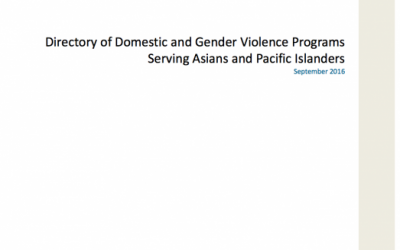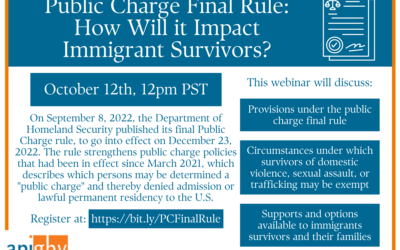Policy Efforts
At API-GBV, we work on the state and federal level to advance policies that benefit the Asian American Native Hawaiian Pacific Islander (AANHPI) community and AANHPI survivors of domestic violence, sexual violence, sexual assault, trafficking, and other gender-based abuses. We work on issues such as culturally specific approaches, immigration and criminal legal system reform, community-based, restorative alternatives for survivors, language access and justice, economic and reproductive justice, and more. If you have any questions or would like to become more involved, please reach out to Grace Huang, Policy Director at API-GBV.
Engaging our Communities: API-GBV Policy/Advocacy Listening Sessions
API-GBV Listening Session for the National Action Plan to End Gender-Based Violence
In September 2021, API-GBV hosted a listening session for the White House’s U.S. National Action Plan to End Gender-Based Violence. Earlier this year, President Biden issued an Executive Order on Establishment of the White House Gender Policy Council that directs the White House Gender Policy Council to develop a national strategy for advancing gender equity and equality. One key implementation mechanism of that national strategy is the creation of a National Action Plan to End Gender-Based Violence.
At our listening session, 17 speakers from our community shared their powerful insights and recommendations on what should be included in a National Action Plan to address all forms of gender-based violence with invited guests from the White House’s Gender Policy Council and Initiative on Asian Americans, Native Hawaiians, and Pacific Islanders (WHIAAPI). Speakers explained how a National Action Plan could reflect the specific needs and priorities of our Asian American Pacific Islander community, including in the areas of prevention, intervention, services, funding, and more. We are grateful to partners at Jahajee Sisters, Turning Point for Women and Families, Maitri, Hmong American Women’s Association, Womankind, My Sister’s House, Immigrant Legal Resource Center, University of Washington, Texas Muslim Women’s Foundation, Sikh Family Center, Pacific Women’s Indigenous Network, Daya, CRDV Network, Asian Women’s Shelter and other advocates for sharing their truths, stories, and critical insights. We look forward to continuing to work with our partners and the White House on this National Act Plan.
Passing Federal Legislation: API-GBV’s Legislative Advocacy
API-GBV is an active member of the National Taskforce to End Domestic and Sexual Violence and our work on the taskforce includes legislative advocacy for the Family Violence Prevention and Services Improvement Act (FVPSA) and Violence Against Women Act (VAWA).
- This year’s Family Violence Prevention and Services Improvement Act (FVPSA), H.R. 2119, includes many improvements for domestic violence survivors, including the creation of a new culturally specific services program, investments in domestic violence prevention, and specific resources for Native Hawaiian survivors. The bill is a great step towards addressing some of the critical disparities facing AANHPI communities and other marginalized communities, in terms of DV services, COVID impacts, and more. Recently, FVPA passed the U.S. House of Representatives, and we will continue to work with our partners to urge the Senate to swiftly pass the bipartisan companion bill, S.1275, to ensure survivors have the support they need.
Sharing Our Perspective: API-GBV’s Administrative Advocacy
As part of our policy/advocacy work, API-GBV submits comments in response to various federal agencies that have issued requests for information or that have issued notices of public rulemaking. This year, API-GBV provided input about the impacts of proposed policies on AANHPI and/or immigrant survivors of gender-based violence, as well as numerous recommendations on how to improves access and responses to support AANHPI and immigrant survivors, including the following highlights:
- In August 2022, APIGBV submitted comments responding to the Federal Communications Commission’s Notice of Inquiry on addressing the needs of survivors in its lifeline and affordable connectivity programs. We emphasized that these programs must account for the impacts that privacy concerns, cultural barriers and stigma, failure of systems to provide meaningful language access, and immigration status, along with the lack of access to financial resources, have on connectivity.
- In May 2022, APIGBV submitted comments to the Department of Justice and Department of Homeland Security regarding the Joint Interim Final Rule (IFR) on a new system for adjudicating asylum, withholding of removal, and protection under Convention Against Torture (CAT) applications. We opposed the continued reliance on expedited removal, as well as the unfeasible timelines published in the IFR. We also proposed alternative procedures that mitigate harmful results without altering the time that the IFR gives USCIS to process filed asylum applications.
- In April 2022, APIGBV submitted comments to the Center for Medicare and Medicaid’s (CMS) in response to their Request for Information on Access to Coverage and Care in Medicaid and CHIP. We highlighted the importance of meaningful language access, timely processing of applications, addressing barriers to enrollment, and access to culturally competent care for immigrant survivors.
- In April 2022, APIGBV submitted comments in response to the National Institutes of Health’s Request for Information (RFI): Seeking Stakeholder Actionable Input to Improve Research on Health and Well-being for Asians, Native Hawaiians, and Pacific Islanders. We shared recommendations on how to improve research on health and well-being for AANHPI’s, primarily in the context of injury and violence prevention and safety, mental health, and women’s health.
- In April 2022, APIGBV submitted comments to the Department of Homeland Security in response to Proposed Rulemaking on the Public Charge Ground of Inadmissibility. We strongly urged that as USCIS move forward with final regulations, and to publish a final rule that advances victim and public safety and health; encourages victims to seek or utilized safety net benefits that are crucial to their ability to escape or recover from abuse and trauma; that does not serve to punish victims for the violence they have experienced; and strengthens their ties to their families.
- In January 2022, API-GBV submitted comments to the Department of Homeland Security on the proposed tip form’s impact on immigrant survivors and likely unnecessary trauma it facilitates through its use.
- In January 2022, API-GBV submitted recommendations to DHS to support the work of the Interagency Task Force on the Reunification of Families, highlighting that the Administration must do more to address the trauma to children and families caused by family separation, in particular survivors of sexual and domestic violence and human trafficking.
Cross-Movement Collaborations: API-GBV and the Alliance for Immigrant Survivors
API-GBV co-chairs the Alliance for Immigrant Survivors (AIS), a national network of advocates and allies dedicated to defending and advancing polices that ensure immigrant survivors of gender-based violence have access to critical protections. We encourage you to visit our Take Action Page or sign up for our email alerts! Here’s what AIS has been up to recently:
- AIS has been actively engaged in ensuring that new public charge regulations lessen the harm of the rule and better shield families from potential attacks from future administrations. Most recently, in April 2022, we sent a letter signed by 73 organizations urging DHS to finalize a public charge rule that addresses the needs of survivors of domestic violence and sexual assault and supports their ability to obtain and maintain safety and well-being. Check out our page on public charge.
- AIS continues to advocate for 5 key policy priorities to provide access to safety for immigrant survivors. This includes lifting the cap on the number of U visas annually available –currently limited to 10,000 –to meet the need; funding USCIS to ensure they can grant timely employment authorization to VAWA self-petitioners, U and T visa applicants; preventing detention and deportation of survivors seeking asylum and eligible VAWA self-petitioners, U and T visa applicants; explicitly including survivors of gender-based violence in asylum law; and ensuring access to economic supports for immigrant survivors.
- AIS created position statements on common anti-immigrant amendments often introduced in legislative and budgetary processes that hinder immigrants’ access to legal status and increase their vulnerability to exploitation. AIS strongly opposes any amendments prohibiting people from getting immigration status due to arrests and/or convictions related to the trauma of domestic abuse, sexual assault, rape, human trafficking, child abuse and other crimes; any amendments limiting funding to jurisdictions for having sanctuary policies; amendments limiting people from accessing public benefits, housing, healthcare, unemployment, tax credits, etc.; and amendments related to limiting access to asylum.
Related Resources
Safeguard Asylum for Survivors – Tell Your Senator to Reject the Emergency National Security Supplemental Appropriations
February 5, 2024 On Sunday night, Senate negotiators released the text of the “Emergency National Security Supplemental Appropriations Act, 2024,” legislation intended to address defense funding and border security concerns. Unfortunately, this funding bill includes...
Directory of Domestic & Gender Violence Programs Serving Asians, Native Hawaiians and Pacific Islanders, 2023
Lists roughly 150 agencies in the U.S. that have culturally-specific programs designed for survivors from Asian and Pacific Islander communities.
UPDATED Advisory: Are Victim Services Programs Liable for Criminal “Harboring” When they Work with Immigrant Survivors of Crime? 2022
This Advisory answers common questions about providing shelter and other program services to undocumented victims, describes the law and federal policy, and proposes best practices for programs
How Do Recent ‘Public Charge’ Policy Changes Impact Immigrant Survivors of Crime?
The Department of Homeland Security (DHS) is proposing a new rule that put longstanding policy about the meaning and application of the “public charge” provisions of immigration law into regulation form. This advisory describes provisions under this new proposed rule and how it will impact immigrant survivors of violence, particularly in light of the pandemic.
Public Charge Final Rule: How Will It Impact Immigrant Survivors?
10/12/22 at 12:00 - 1:00pm PSTOn September 8, 2022, the Department of Homeland Security (DHS) published its final Public Charge rule, to go into effect on December 23, 2022. The rule strengthens public charge policies that had been in effect since March 2021, which...
API-GBV Welcomes Protections For Immigrant Survivors Under the Final Public Charge Rule
September 8, 2022 This morning, the U.S. Department of Homeland Security (DHS) published its final Public Charge rule. The final rule will be published in the Federal Register for public inspection tomorrow, September 9th and will go into effect December 23rd....
Advisory: How Do Recent HUD Proposed Rules About Verification of Immigration Status Impact Survivors of Domestic & Sexual Assault?
The Department of Housing and Urban Development (HUD) proposed regulations that change longstanding policy relating to immigration status verification requirements and disallowing those ineligible for federal housing assistance (i.e., members of “mixed-status” households) from residing in HUD’s public and specified assisted housing programs. This advisory describes impacts of the proposed rule on immigrant survivors of violence
May 2019 Advocate & Legal Services Findings: Immigrant Survivors Fear Reporting Violence
In May 2019, a coalition of national organizations gathered feedback from nearly six hundred advocates and attorneys from across the United States, learning that many immigrant victims of domestic and sexual violence are now too afraid to call the police or go to court to get help. The advocates report that survivors have an increased fear of deportation, retaliation by their abusers, and separation from their children.


